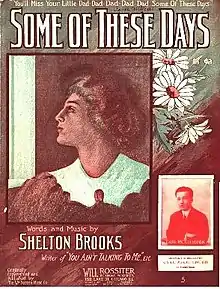Some of These Days
"Some of These Days" is a popular song, written and composed by Shelton Brooks, published in 1910, and associated with the performer Sophie Tucker.
| "Some of These Days" | |
|---|---|
 1910 sheet music cover | |
| Song by Sophie Tucker | |
| Published | 1910 |
| Genre | Jazz standard |
| Songwriter(s) | Shelton Brooks |
Background
Shelton Brooks and "Some of These Days" was brought to Sophie Tucker's attention in 1910 by her maid, who insisted she meet Brooks and hear the song.[1] Tucker instantly recognized its hit potential, performed and recorded many versions throughout the years, and eventually it became her signature song - including landing movie appearances to perform it.
Tucker first recorded the song along with others on wax cylinder format in 1910-11. In 1926, on 78 RPM record format and backed by Ted Lewis and his band, Tucker recorded her classic, million-selling 1926 version, which stayed in the #1 position on the charts for five weeks beginning November 23, 1926, and re-affirmed her lasting association with the song.[2]
"Some of These Days" has been recorded by many other artists, including Ethel Waters, Louis Armstrong, Coco Briaval, Elkie Brooks, Cab Calloway, Bing Crosby, Bobby Darin, Ella Fitzgerald, Judy Garland, Matt Forbes, The Hot Sardines, Susan Maughan, The McGuire Sisters, the Original Dixieland Jass Band, Sue Raney, Serena Ryder, Sidney Bechet,[3] Leon Redbone, and recently by Erica Lewis with the band Tuba Skinny.
Appearances in film
"Some of These Days" made the first of many movie soundtrack appearances in Lights of New York (1928), the first "all talking" motion picture, being one of several songs played by the house band of the nightclub where the film is set. Sophie Tucker herself sang "Some of These Days" in character as a nightclub singer in the 1929 film Honky Tonk with reprise performances (as herself) in Broadway Melody of 1938 and Follow the Boys (1944).
Other films to feature the song include Scarface and Three on a Match, which are both 1932 releases and both featuring actress Ann Dvorak dancing to the song: in Scarface the song is played in a nightclub by Gus Arnheim's band while in Three on a Match Dvorak dances while actor Harry Seymour plays "Some of These Days" on a piano.
In the 1936 version of Rose-Marie Jeanette MacDonald as the title character attempts a lyric soprano rendition of "Some of These Days" in a Klondike café whose regular vocalist (Gilda Gray) upstages McDonald with an earthy performance of the song. "Some of These Days" was also featured in the 1939 release Only Angels Have Wings in which Jean Arthur plays the song on the piano in a cantina.
Other soundtrack appearances of the song include:
- The song is performed in the 1930 Talkartoon cartoon Wise Flies by a villainous spider attempting to seduce a female fly. The spider's vocals are taken directly from a 1929 recording of the song by Eddie Peabody.
- Leland Palmer, Ann Reinking and Erzsebet Foldi perform the song in the film All That Jazz (1979).
- Cab Calloway's recording appears on the soundtrack of Forbidden Zone (1980), with Oingo Boingo member Gene Cunningham in the role of Papa Hercules lip synching Calloway's vocals.
- Kevin Spacey, playing Bobby Darin, performs the song over the closing credits of the film Beyond the Sea (2004).
- The HBO original series Boardwalk Empire used this song in its first episode[4] as well as the ninth episode of season 1: "Belle Femme".[5]
- In the television series White Collar, in the episode 'Empire City', character June Ellington sings this song during the finale of the episode.
Appearances in fiction
- The song, or a particular recording of it, is a recurrent theme in Jean-Paul Sartre's 1938 novel Nausea. Sartre imagines some details of the "Negress" who sings it, possibly Ethel Waters. He further imagines that it was composed by a "Jew with black eyebrows" rather than the actual composer, Shelton Brooks.
- In the 1920-set HBO drama Boardwalk Empire, the 1911 version of the song by Sophie Tucker is played in the pilot episode. In the ninth episode, Sophie Tucker appears as a character (played by Kathy Brier) in a cabaret show and sings the song.
- Early in the novel Sexus by Henry Miller, the song is mentioned as being sung during a dinner celebrating a work bonus of $350.
- The song's lyrics are featured in "Batman" vol. 3 Annual 2 (2017) by Tom King.
See also
References
- Virtual Museum of San Francisco, Sophie Tucker and "Some of These Days" http://www.sfmuseum.net/hist2/days.html
- CD liner notes: Chart-Toppers of the Twenties, 1998 ASV Ltd.
- "Bechet Discography" - The Sidney Bechet Society http://www.sidneybechet.org/discography/
- https://web.archive.org/web/20170428022222/http://www.hbo.com/boardwalk-empire/episodes/01/01-boardwalk-empire/music.html
- https://web.archive.org/web/20170707163838/http://www.hbo.com:80/boardwalk-empire/episodes/01/09-belle-femme/music.html